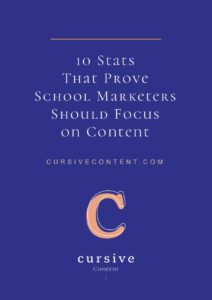10 Stats That Prove School Marketers Should Focus on Content

The importance of producing great school marketing content is nothing new. However, there’s been a shift.
Audiences expect content that provides genuine value and creates a feeling of connection. We all have endless information available to us at any moment in time, via computer, smartphone, or tablet — and this access to infinite information raises expectations about when and how brands communicate to their audiences. And, yes — your school counts as a brand.
Whether you’re tentatively clinging to traditional marketing and looking for more certain reasons to make the shift, hoping to convince school leadership about the importance of content and storytelling in school marketing, or just want to understand the current state of content, these stats will show just why a content-rich and storytelling-focused approach should matter to your school.
Content helps increase search visibility.
Companies that blog have, on average, 55% more site visitors, 97% more inbound links, and 434% more indexed pages (Source).
Content creates a relationship with your audience.
70% of consumers say they feel closer to a company thanks to content marketing. (Source)
A content-focused approach is budget-friendly.
Content marketing has saved marketing budgets: it’s shown to cost 62% less than traditional marketing. Plus, content marketing generates three times more leads for each dollar spent. (Source)
Paid online advertising isn’t as effective.
Around 200 million people use ad-blocking software (Source), and 70% of people say they would rather learn about a company via articles than advertisements (Source).
Storytelling engages the mind in a different way.
Neural activity in the human brain ramps up—as much as five times more than usual—when we hear a story. (Source)
Storytelling increases recall.
People are 22 times more likely to remember something told to us in story form, rather than straight fact. (Source)
Email content shows impact.
For every dollar spent, email marketing has an ROI of $38. (Source)
Prospective students and families use all types of content to formulate their decisions.
Half of teens use five or more social media platforms in the college research process (Source) and the majority of students are more likely to consider institutions that use email, text, and social media to communicate, over traditional forms of communication like brochures and phone calls. (Source)
The data can’t tell you exactly what’s right for your school, but it can point you in the right direction. Your audience wants to hear from your school. Are you responding?
Need more making the case for content to school leadership? Read this.
MORE ARTICLES
-
 Why “Strong Academics & Caring Community” Aren’t a School Story
Why “Strong Academics & Caring Community” Aren’t a School Story -
 Busy, Scattered, Exhausting: What’s Really Wrong With Your School Marketing
Busy, Scattered, Exhausting: What’s Really Wrong With Your School Marketing -
 Why Most Schools Don’t Actually Have a Clear Story
Why Most Schools Don’t Actually Have a Clear Story -
 Clarity in 50 Words or Less: How to Write Your School’s One-Sentence Story
Clarity in 50 Words or Less: How to Write Your School’s One-Sentence Story -
 What Should Your School Do with Its Blog Now That AI Is Changing Search?
What Should Your School Do with Its Blog Now That AI Is Changing Search? -
 What Is Your Private School’s Bold & Unifying Big Promise?
What Is Your Private School’s Bold & Unifying Big Promise? -
 AI Writing Prompts to Power Private School Storytelling
AI Writing Prompts to Power Private School Storytelling -
 When to Outsource Your Private School Content Marketing to an Expert
When to Outsource Your Private School Content Marketing to an Expert
